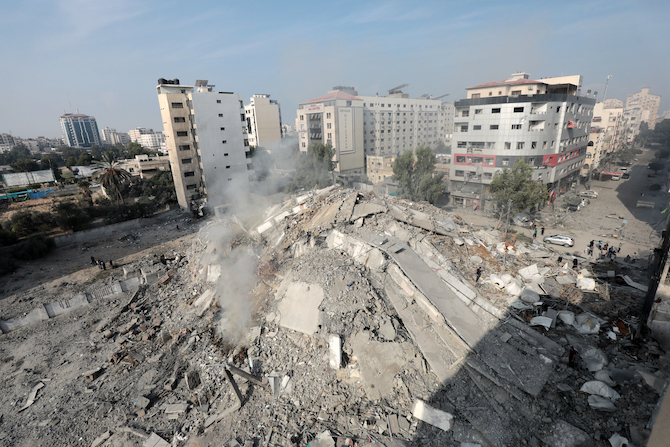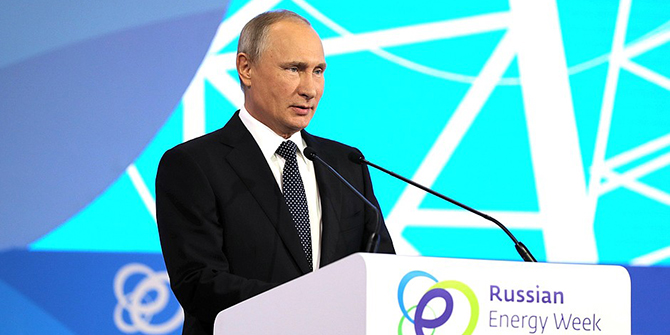by Nesrin Alrefaai

Russian President Putin’s strategic approach in the Israel-Hamas conflict is noteworthy, as he seeks to capitalise on the situation to critique and undermine the influence of the United States on the international level. Russian Foreign Minister Sergey Lavrov had compared Israel’s war on Hamas in Gaza to the Russian invasion of Ukraine, seeking to draw comparisons between Israel’s fight against Hamas and Russia’s war on Ukraine, aiming to rationalise the Russian invasion.
In November 2023, amid the Israel-Hamas conflict in Gaza, Russia issued a call for a ceasefire, a rare diplomatic intervention, especially when compared to most Western politicians who are advocating for a ‘pause’ and avoiding explicitly terming it as a ceasefire. Notably, Russia’s President Putin strategically refrained from assigning blame to either Hamas or Israel, opting for a generic condemnation of ‘all violence and hostilities directed against civilians and all acts of terrorism’.
The Kremlin considers the ongoing conflict between Israel and Hamas a blessing for Putin. However, he has had to walk a fine line between the warring parties. For Russia, the Middle East war is an opportunity not only to criticise US aid to Israel, but also for Putin to position himself as a prominent player in the region by mediating de-escalation and stating that ‘Russia is ready to coordinate with all constructive partners’. In a summit in Kyrgyzstan on October 13, Russia even proposed itself as a mediator in the ongoing negotiations between Israel and Hamas.
Geopolitical Gains
Russia’s involvement in the Israel-Hamas conflict is driven by a pursuit of economic benefits, with the anticipation of rising crude oil prices amid Middle East turmoil. The geopolitical gains include enhancing export value and acquiring additional funds for defence purposes, effectively undermining oil sanctions and bolstering Russia’s position on the global stage. Another advantage for Putin is the belief that the conflict may have halted or jeopardised US efforts to normalise Arab-Israeli relations.
Diverting Attention from Ukraine
The conflict in Gaza further serves as a means for Russia to divert attention from the ongoing Ukraine conflict. By forcing the US to make challenging decisions on resource allocation between Israel and Ukraine, Putin is successfully navigating a complex geopolitical landscape. The fact that the US is now sending some weapons originally earmarked for Ukraine to Israel instead is another victory for Russia.
While Putin faces challenges in retaining his power grip domestically, especially in the aftermath of Navalny’s death, Israeli Prime Minister Netanyahu is persisting with his war agenda and vows to not stop fighting. The United States retains the ability to manage support for both Israel and Ukraine, especially if it can prevent conflicts from escalating into scenarios requiring US military intervention and a repeat of the 1967 war and the Israel-USA ‘Special Relationship’.
Syria: A Gateway to Influence
Regional instabilities have proven advantageous for Russia, solidifying its influence and allowing it to assert control over geopolitical dynamics, thereby strengthening its strategic position. Although Syria was reinstated into the Arab League In May 2023, its influence in regional politics remains ineffective. Nevertheless, Syria continues to serve as Russia’s primary gateway to influence in the region. Ongoing conflicts in the region have provided the justification for Russia’s continued military presence in Syria and enhanced geopolitical power.
According to Al Jazeera, Israel conducted 13 attacks on Syria in 2022 and 9 in 2023, with continuous strikes requiring coordination with both the United States and Russia. Positioned as the ‘guarantor’ of the Syrian government’s territorial control, Russia has emerged as one of the beneficiaries of these orchestrated attacks. While ostensibly condemning the attacks on an international level, Russia is strategically positioning itself as the international player opposing such actions, thus shaping the narrative projected to the Syrian populace and the wider region. Russia navigates a delicate balance between not upsetting Iran and allied groups such as Hezbollah in Syria on one hand, and maintaining relations with Israel on the other. Against the backdrop of the Israel-Hamas conflict, Russia’s intricate strategic calculations have come to the fore.
The complex interplay between regional powers, economic considerations, and geopolitical manoeuvring underscores Russia’s nuanced politicking in the Middle East. This approach has significantly influenced the dynamics of the Israel-Hamas conflict and carries broader implications for the global geopolitical landscape. In essence, Russia’s multifaceted strategic calculations in the Middle East have far-reaching implications for the dynamics of the Israel-Hamas conflict and contribute to the evolving landscape of regional geopolitics.
Moreover, of significant importance is the US announcement regarding retaliatory measures against armed groups in Syria and Iraq in response to the attack on an American military outpost in Jordan. This will necessitate coordination with Russia to avoid any inadvertent targeting of Russian assets in Syria. The balance maintained by Putin, while advantageous in the short term, raises questions about the sustainability of Russia’s role as international actor and power player. Additionally, it is uncertain how long Israel can accept Russia’s balancing act when it comes to Palestine and Hamas, considering the ongoing bombardment in Gaza with the stated Israeli aim to ‘eliminate’ Hamas. Lastly, questions continue about the United States’ ongoing ability to effectively manage support for both Israel and Ukraine in the long run, all the while seeking to avoid more escalation in the region.






